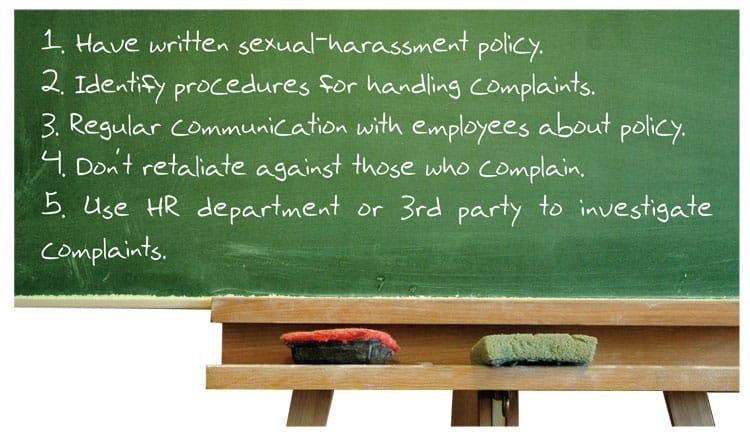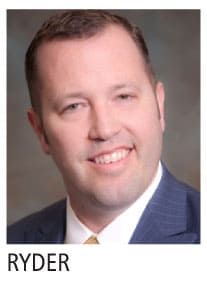Improve culture with zero tolerance: Communication, training key to preventing sexual harassment in workplace

 Companies that want to make sure sexual harassment doesn’t take place in their workplace should enact policies that stress they have zero tolerance for this type of behavior, and they must stand behind them, said Melissa Standard, a partner and consultant at Integrated HR Solutions LLC in Fort Collins. They also must have procedures in place for how to handle these types of complaints.
Companies that want to make sure sexual harassment doesn’t take place in their workplace should enact policies that stress they have zero tolerance for this type of behavior, and they must stand behind them, said Melissa Standard, a partner and consultant at Integrated HR Solutions LLC in Fort Collins. They also must have procedures in place for how to handle these types of complaints.
 “A sexual harassment policy is critical,” Standard said. Company executives need to say outright that they won’t stand for this type of behavior, and a set policy needs to be outlined in the employee handbook. This helps protect the company, she said.
“A sexual harassment policy is critical,” Standard said. Company executives need to say outright that they won’t stand for this type of behavior, and a set policy needs to be outlined in the employee handbook. This helps protect the company, she said.
The company must also adopt a policy that states that there won’t be any retaliation against an employee for reporting sexual harassment or discrimination in the workplace. “These policies should instruct the employees on the proper procedures and options for reporting,” Standard said.
SPONSORED CONTENT
Empowering communities
Rocky Mountain Health Plans (RMHP), part of the UnitedHealthcare family, has pledged its commitment to uplift these communities through substantial investments in organizations addressing the distinct needs of our communities.
Companies should use their own human-resources department or an independent third party for an investigation.
“Do your due diligence. Do not assume that the employee doesn’t have a claim,” she said. “Do not discipline or terminate a person who has just complained of harassment. Acknowledge their concerns, and take steps to initiate an investigation.”
Standard points out that it isn’t just the claims of sexual harassment that end up costing a company money but the retaliation suits that come with them.
According to 2016 data from the Equal Employment Opportunity Commission, almost half of the 91,503 charges of workplace discrimination included a retaliation claim. That is 42,018 suits, or 45.9 percent of all charges filed.
“It’s up to company leadership to have a ‘no-tolerance’ philosophy, which will ideally trickle down. If leadership witnesses anything they would perceive as potentially inappropriate, they should take immediate steps to remove the behavior,” Standard said.
Sexual-harassment training is also very important. And while she admits it isn’t exciting, it does show due diligence on the part of the employer. If somebody does come to a manager and reports that they have been harassed, Standard said that the company should “take the complaint seriously and utilize an independent consultant to conduct the investigation.”
Many small companies don’t have in-house human-resource departments, so it is hard for them to pursue an investigation. If the claim does go to trial, the independent third-party findings will be more legitimate than saying the CEO investigated and found nothing, she said.
 Nikki Larchar, co-founder and HR business partner for simplyHR in Fort Collins, said that to prevent sexual harassment in the workplace, companies need to empower “every single individual within a company to be an advocate for a harassment-free workplace.”
Nikki Larchar, co-founder and HR business partner for simplyHR in Fort Collins, said that to prevent sexual harassment in the workplace, companies need to empower “every single individual within a company to be an advocate for a harassment-free workplace.”
She agreed with Standard that training employees and managers about how to deal with sexual harassment is an important first step.
“We highly recommend that the training is conducted in person, by a certified HR professional, attorney or consultant who specializes in harassment training. Interactive activities are a great tool to help educate individuals not only on how to identify harassment but to also provide guidance on how, even at an individual level, employees can combat harassment in the workplace,” Larchar said.
How managers, business owners and HR departments respond to harassment claims is another way to prevent future occurrences of harassment, she said.
“A thorough investigation should be conducted when an employee reports a claim, or if it becomes known by an individual that there may be reasonable suspicion that there is harassment happening in the workplace,” she said. “Responding and acting on known and unknown harassment is the best way to proactively prevent any future occurrences.”
Conversations about sexual harassment should happen frequently. Larchar said that sexual harassment is not always an easy subject to discuss, but it is an important topic around which to have open communication.
“Regular check-ins with employees are great for the overall culture of a company; don’t be afraid to add in questions to check in with employees on their feelings and experiences around harassment. Encouraging employees to communicate when they experience harassment, empowering them to come forward and, when applicable, combat harassment, will shape your overall culture,” she said.
 Amanda Ericson, legislative director for the Northern Colorado Human Resources Association, which is a local chapter for the Society of Human Resource Management, said that her group and others like it are a reliable resource for all things related to human resources.
Amanda Ericson, legislative director for the Northern Colorado Human Resources Association, which is a local chapter for the Society of Human Resource Management, said that her group and others like it are a reliable resource for all things related to human resources.
“In the current climate, the need for good anti-harassment (including sexual-harassment) policies and procedures is necessary. SHRM provides educational materials, template policies, training resources, investigation resources and compliance resources for any company looking to review or implement anti-harassment policies for their organization,” Ericson said.
Patrick Ryder, vice president and executive liability practice leader for Hub Colorado, said that companies need to take sexual harassment seriously in the current environment.
“Taking a stand as far as a risk management approach to sexual harassment is an important part of business accountability,” he said. “The average defense and court cost to take a claim to court is about $200,000 before you settle on indemnification. From a small-business perspective, it can be extremely damaging if you let the culture fester. If you have a culture that is permissive of sexual harassment and discrimination you could face class action suits and then damages multiplied by the tens or hundreds: millions of dollars. That can really cripple a company.”
Companies can no longer turn a blind eye to the “boys will be boys” attitude.

“It is unacceptable. It has always been unacceptable, but the willingness to act on it has never been at the level it has been today. In particular, women and men are more willing to speak out, and there are more platforms in which to speak out,” Ryder said. “As more people come forward, it is not as behind-the-scenes, and people are more comfortable saying ‘that is not right’ as opposed to ‘that is the way it has always been.’”
See related stories:
 Companies that want to make sure sexual harassment doesn’t take place in their workplace should enact policies that stress they have zero tolerance for this type of behavior, and they must stand behind them, said Melissa Standard, a partner and consultant at Integrated HR Solutions LLC in Fort Collins. They also must have procedures in place for how to handle these types of complaints.
Companies that want to make sure sexual harassment doesn’t take place in their workplace should enact policies that stress they have zero tolerance for this type of behavior, and they must stand behind them, said Melissa Standard, a partner and consultant at Integrated HR Solutions LLC in Fort Collins. They also must have procedures in place for how to handle these types of complaints.
 “A sexual harassment policy is critical,” Standard said. Company executives need to say outright…
“A sexual harassment policy is critical,” Standard said. Company executives need to say outright…
THIS ARTICLE IS FOR SUBSCRIBERS ONLY
Continue reading for less than $3 per week!
Get a month of award-winning local business news, trends and insights
Access award-winning content today!

